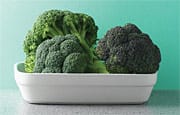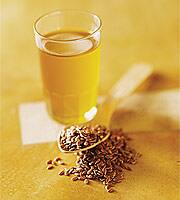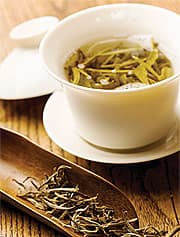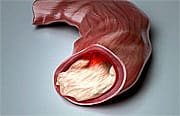Life Extension Magazine®
Zinc Supplements Associated With Reduced Risk of Advanced Prostate Cancer | |
The journal Nutrition and Cancer published the finding of an association between the intake of zinc supplements and a reduced risk of advanced prostate cancer.* Emily White and colleagues evaluated data from 35,242 men who participated in the VITAL study of the impact of dietary supplements on cancer risk. Eight hundred thirty-two participants developed invasive prostate cancers over a four-year follow-up period, categorized as local, regional, or distant invasion. While a weak relationship was observed between a reduced risk of all invasive prostate cancers and long-term supplementation with over 15 mg of zinc per day, the risk of regional/distant prostate cancer was 66% lower among subjects who reported supplementing with this amount of zinc compared with those who did not supplement. “If future studies support these results, it may suggest that zinc supplements may be beneficial for some subgroups of men for the most adverse forms of the disease,” the authors concluded. —Dayna Dye | |
| Reference | |
| * Nutr Cancer. 2009 Mar;61(2):206-15. | |
Dietary Lignans May Help Control Body Weight | |
High consumption of dietary lignans is associated with lower body fat and greater insulin sensitivity according to a study in Canadian women.* Lignans are a type of phytoestrogen found in fruits, vegetables, whole grains, and seeds, especially flaxseed. Subjects were 115 postmenopausal women who were free from endocrine diseases and not using hormone replacement. The women underwent testing for body fat, insulin sensitivity, dietary phytoestrogen intake, and blood levels of enterolactone, the major lignan metabolite. Women with the highest levels of lignan intake, whether measured as dietary lignan consumption or blood levels of enterolactone, had significantly lower body mass index, lower total-body fat mass, and better insulin sensitivity than women with the lowest dietary intake or the lowest enterolactone levels. Fat mass alone was 8.5 kg lower in the high-enterolactone group. Better metabolic profile with high lignan consumption was independent of calorie intake or physical activity. These findings underscore the importance of consuming a plentiful amount of lignans for good health. —Laura J. Ninger, ELS | |
| Reference | |
| * http://journals.cambridge.org/action/displayAbstract;jsessionid=ECF40C9DB355FCBBAC3C0C1B71ADF5FA.tomcat1?fromPage=online&aid=3387180. | |
Superoxide Dismutase Improves Cognitive Function | |
| Supplementation with the antioxidant superoxide dismutase (SOD) prevents stress-induced impairment of learning and memory in mice.* Chronic stress was induced in the mice by immobilization for 12 hours per day in narrow cages. Four randomly assigned groups were studied: restrained mice fed a normal diet, restrained mice supplemented with vitamin E, restrained mice supplemented with a specialized SOD extract derived from melons (GliSODin®), and control mice without restraint or dietary changes. After five weeks, cognitive function was tested with a standard water-maze swimming test. SOD supplementation, but not vitamin E supplementation, was associated with significantly faster learning and better spatial memory when compared with the restrained, non-supplemented mice. Learning and memory in the SOD group were equivalent to those in the control group. Brain autopsies revealed that only SOD supplementation achieved both lower lipid peroxidation (oxidative stress) and greater generation of neurons than in the restrained, non-supplemented group. —Laura J. Ninger, ELS | |
| Reference | |
| * www.nutraingredients.com/Research/SOD-supplement-may-ease-brain-impairment-Mouse-study. | |
Osteoporosis Drug Effective in Breast Cancer | |
| Zoledronic acid (Zometa®)improves outcomes when added to standard therapy for estrogen-responsive breast cancer in premenopausal women.1 Zoledronic acid belongs to the bisphosphonate class of medications, which fight bone loss and osteoporosis. The study enrolled 1,803 premenopausal women after surgery for early-stage breast cancer that tested positive for estrogen receptors. The women were randomly assigned to one of two different endocrine (hormone-suppressive) regimens, with or without zoledronic acid, for three years. Disease-free survival was analyzed at a median of 48 months later. At that time, 137 deaths, relapses, or new tumors had occurred. Disease-free survival was similar for the two endocrine regimens when given alone. However, individuals using both zoledronic acid and endocrine therapy had a 36% lower risk of disease progression, compared with individuals using endocrine therapy alone. These data confirm research indicating that bisphosphonates have cancer-fighting properties and further support Life Extension®’s recommendation that certain cancer patients use bisphosphonates. For more than 10 years, Life Extension has reported that bisphosphonates may help prevent certain sequelae of breast and prostate cancer, such as bone metastasis.2 Any patient taking a bisphosphonate drug should also take at least 1,000 mg of highly absorbable calcium, along with vitamins D and K. —Laura J. Ninger, ELS | |
| Reference | |
| 1. N Engl J Med. 2009 Feb 12;360(7):679-91. | |
Gamma Tocopherol May Prevent Prostate Cancer | |
The gamma-tocopherol form of vitamin E may prevent prostate cancer, according to a newly published study.* Japanese researchers conducted a series of experiments using mice specially bred to develop human-type prostate carcinoma. In one experiment, young male rats received either the alpha-tocopherol form of vitamin E in the diet, or gamma tocopherol, for 10 weeks. In a second experiment, young male rats received one of three different concentrations of gamma tocopherol in the diet for seven weeks. In both experiments, gamma tocopherol significantly suppressed the progression of prostatic lesions from a microscopic, precancerous state to full-blown prostate cancer. Furthermore, the suppression effect increased with escalating doses of gamma tocopherol. The study, “clearly demonstrated that gamma tocopherol suppresses prostate tumor progression in [a live animal model], and could be a candidate chemopreventive agent for human prostate cancer,” the investigators noted. —Dale Kiefer | |
| Reference | |
| * Prostate. 2009 Jan 13. | |
Tea Drinkers May Have Lower Stroke Risk | |
Daily consumption of green or black tea is associated with a reduced risk of stroke, according to a review of the medical literature.* Investigators searched for studies that examined the association between green or black tea drinking and fatal or non-fatal stroke. Nine studies from six countries were identified that included 4,378 strokes among nearly 200,000 persons. Pooled data revealed that drinking three or more cups of tea per day was associated with a 21% lower risk of stroke when compared with the consumption of less than one cup per day. The results were independent of type of tea, country of origin, and Asian versus non-Asian race. Proposed mechanisms for a reduction in stroke include beneficial effects of tea polyphenols (catechins) and the amino acid theanine on cardiovascular health. —Laura J. Ninger, ELS | |
| Reference | |
| * Stroke. 2009 Feb 19. | |
Daily Consumption of Potato Chips Encourages Inflammation, Atherosclerosis | |
According to the results of a study published in the American Journal of Clinical Nutrition, chronic consumption of fried foods, such as potato chips, sharply increases inflammation.* Foods exposed to high heat during cooking contain acrylamides: toxic chemicals linked to the proinflammatory state. Increased inflammation is a risk factor for atherosclerosis, the root cause of most cardiovascular disease. Investigators recruited 14 healthy subjects who consumed approximately six ounces of potato chips daily for one month. Potato chips have a relatively high acrylamide content. At the end of the study period, various markers of oxidative stress and inflammation, including oxidized low-density lipoprotein (LDL), high-sensitivity interleukin-6, and plasma high-sensitivity C-reactive protein (CRP), were significantly increased in all subjects. Four weeks after the end of the study, inflammation markers “decreased to some extent,” researchers noted. “These novel findings seem to indicate that chronic ingestion of acrylamide-containing products induces a proinflammatory state, a risk factor for progression of atherosclerosis,” investigators concluded. —Dale Kiefer | |
| Reference | |
| * Am J Clin Nutr. 2009 Mar;89(3):773-7. | |
Published Study Confirms Weight Loss and Metabolic Benefits of Irvingia | |
Irvingia extract “significantly reduces body weight and improves metabolic parameters in overweight humans,” according to a study recently published in Lipids in Health and Disease.* Derived from wild African mango seed, Irvingia extract was first widely introduced to the American public by Life Extension®, for the control of overweight and obesity, in 2008. In this randomized, double-blind, placebo-controlled clinical trial, scientists examined the effects of Irvingia (Irvingia gabonensis) on obesity and related health parameters in 102 overweight and obese individuals. They received either 150 mg Irvingia extract or placebo twice daily, 30-60 minutes before meals, for 10 weeks. The individuals receiving Irvingia experienced significant reductions in body weight, body fat, waist circumference, and blood lipid parameters, compared with placebo subjects. Additionally, serum levels of C-reactive protein (CRP) dropped by 52% in the test group, as opposed to just 1.2% in the placebo group. Irvingia may benefit the millions of Americans who struggle with health challenges related to excess weight. —Dale Kiefer | |
| Reference | |
| * Lipids in Health and Disease. 2009 Mar 2;8:7. | |
Calcium Helps Prevent Cancer | |
| High calcium intake reduces the risk of cancer, especially in women, according to the National Institutes of Health (NIH)-AARP (formerly American Association of Retired Persons) Diet and Health Study.* Data were gathered from questionnaires mailed in six states to AARP members aged 50 to 71 years. Respondents indicated typical food, dairy, and supplement consumption and health characteristics at baseline. After seven years of monitoring, 36,965 cancer diagnoses in men and 16,605 in women were recorded. Among women, the overall risk of cancer decreased as total calcium intake increased, up to a level of 1,300 mg/day but not beyond. Calcium had no significant effect on overall risk of cancer in men. However, both women and men with the highest level of calcium or dairy food intake had a reduced risk of digestive system cancers, amounting to a 23% decrease in women and a 16% decrease in men. The risk was especially low for colorectal cancer. —Laura J. Ninger, ELS | |
| Reference | |
| * Arch Intern Med. 2009 Feb 23;169(4):391-401. |










